12 Reasons You Never Knew Behind Rectal pain
20
July
2021
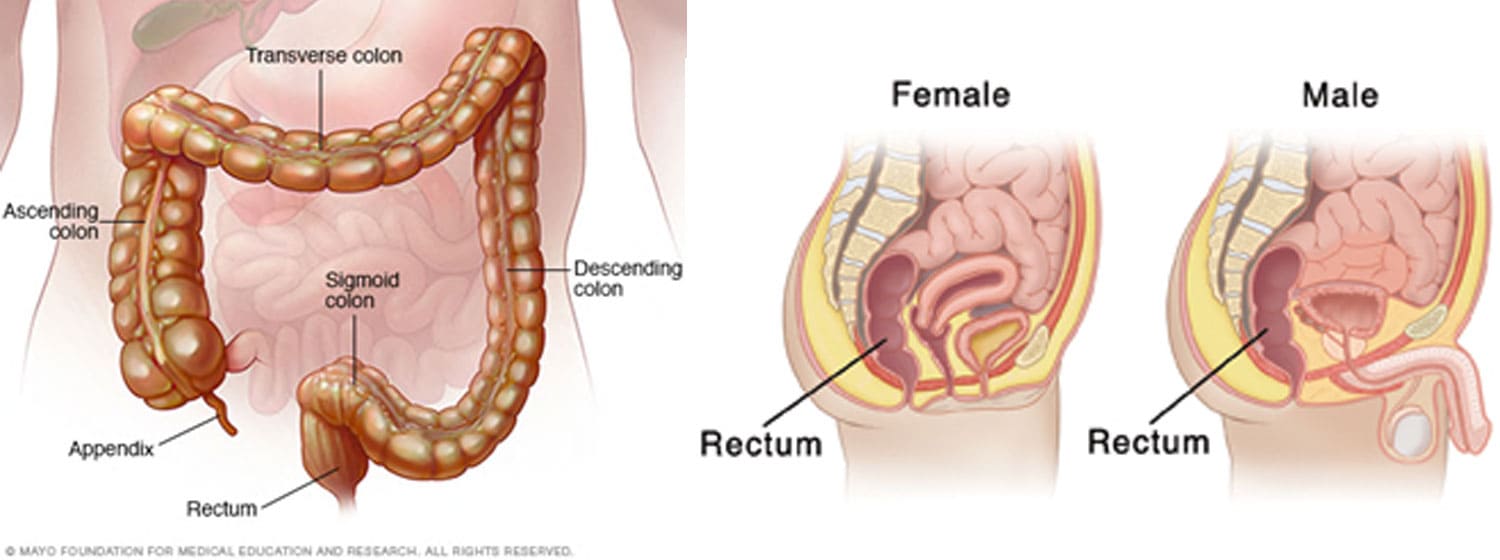
One cannot start defining rectal pain without identifying where the rectum is positioned. The rectum is located within the pelvic cavity, and is the last segment of the large intestine. The end of the rectum is the beginning of the anal canal. Now that the visual of where the injury might occur has been done, note that any pain or discomfort in the anus, rectum, or lower region of the gastrointestinal (GI) tract can be referred to as rectal pain. To get a break down of the causes, symptoms, and diagnosis of rectal pain, keep reading.
What is Causing my rectal pain?
Rectal pain is a common occurrence with causes hardly ever grave. Pain in the rectum is usually a result of muscle spasms or constipation. However, there are some more scientific causes that are worth mentioning, and they include:
-
Anus Trauma
Anal play during sex or frequent masturbation causes trauma or injury to the rectum or anus. An injured rectum may also be caused by a very harsh fall while performing any activity. The trauma happens because the skin around the rectum is extremely thin and delicate, which might lead to small rips, discomfort, swelling, and bleeding. This is due in part to the fact that the anus does not create its own lubricant.
-
STD
STI’s or sexually transmitted diseases, usually as a result of sexual intercourse or in this case anal sex, can spread to the rectum from the genital area and in some cases might cause pain.
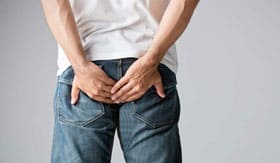
-
Anal Fissures
Small tears in the thin tissue that lines the rectum's opening are known as anal fissures. They're extremely prevalent, especially among infants and new mothers. When hard or big feces stretch the sensitive rectum lining and rip the skin, fissures form. They take a long time to recover because any bowel movement might irritate and inflame the tissue even more.
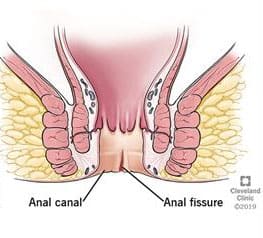
The pain is usually described as a recurring sharp knifelike sensation. The ache may then turn into a dull throbbing sensation that lasts for hours.
In the case of anal fissures, it is advised to switch to moist baby wipes instead of normal toilet paper to avoid irritating the fissure further. -
Hemorrhoids
Rectal pain is frequently caused by hemorrhoids. Hemorrhoids affect nearly one-third of all adults at some point in their lives (Gotter, 2017). Hemorrhoids are inflamed veins in the anus that are caused by straining during bowel movements. They are frequent in pregnant women and in those who have done a lot of hard lifting. The most obvious result of hemorrhoids is bloody stool. If your hemorrhoids rupture, you may experience excruciating pain that starts suddenly and lasts for several days. Seek medical attention right away if you're experiencing severe anal pain and rectal bleeding.
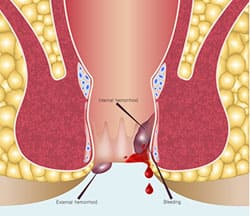
-
External Hemorrhoids
Also called Perianal hematomas, an external hemorrhoid is a lump on the anal aperture, which is due to the accumulation of blood that has transferred to the tissues around the anal opening.
-
Anal Fistula
Anal fistula is defined by a narrow tunnel formed around the anus, usually between the end of the bowel and the anal skin. It is frequently caused by an infection around the anus, which results in a pus collection (abscess) in adjacent tissue. Anal fistulas can cause a variety of unpleasant symptoms, including discomfort and skin irritation, and these sensations rarely go away on their own. In most cases, doctors advise surgery.
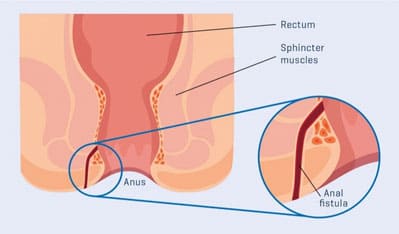
-
Muscle Spasm
Muscle spasm are the result of many conditions including one called Proctalgia Fugax, which is identified as a brief rectal spasm. The muscles surrounding the rectum, like all muscles, can spasm, which causes pain. Spasms in the rectal area can last anywhere from a few seconds to many minutes and can be triggered by a number of factors, including bowel movement, sexual activity, constipation or, in some cases, for no apparent reason. According to certain studies, proctalgia is rather frequent, affecting up to 18% of the population, and develops in adults ages 30–60, mostly women (Jeyarajah, 2013).
-
Solitary rectal ulcer syndrome
Solitary rectal ulcer syndrome is an uncommon condition that doesn’t have enough light shed upon it. It tends to affect patients who have been constipated for a long time. It can result in, despite its name, one or a multitude of ulcers and will usually end up in rectal bleeding and intestinal straining.
-
Tenesmus
Tenesmus is the physical sensation of having to use the bathroom, even if your colon is empty. When trying to pass stool, one might feel pressure, pain, a strong desire to strain, cramps, or might even experience nausea. Tenesmus isn’t a condition by itself but rather a symptom that is experienced due to issues in the gastrointestinal system. It may also be a sign of an intestinal movement disorder.
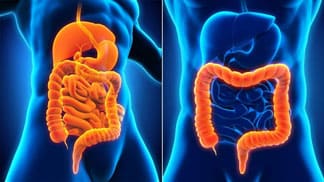
-
IBD
Inflammatory bowel disorder is a collection of gastrointestinal disorders that can cause inflammation, discomfort, and bleeding in the rectum and other parts of the digestive tract.
-
Proctitis
Proctitis is the inflammation of the rectum's lining. Although it can happen to anyone, it's more prevalent in those with IBD. Proctitis can be caused by STDs or might be the outcome of cancer radiation therapy.
-
Levator syndrome
Levator syndrome is a condition characterized by recurring discomfort in the rectum, sacrum, or coccyx, as well as uncomfortable pressure in the buttocks and thighs. Even though the cause is unknown, it is mostly caused by spasms or inflammation in the pelvic floor muscles called levators.
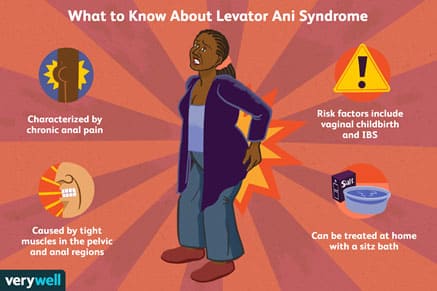
As mentioned above, rectum pain is classified as pain in the anus, rectum, or lower GI tract. On top of that, the causes vary greatly and are very individualistic, meaning that pain experienced by one individual might not be experienced by the next. To prove this, here is a study done investigate the different characteristics of anal pain, also known as functional anorectal pain (FARP). In the graph below, you will see the different causes of FARP, as well as the number of individuals who feel and don’t feel any sort of anal pain.
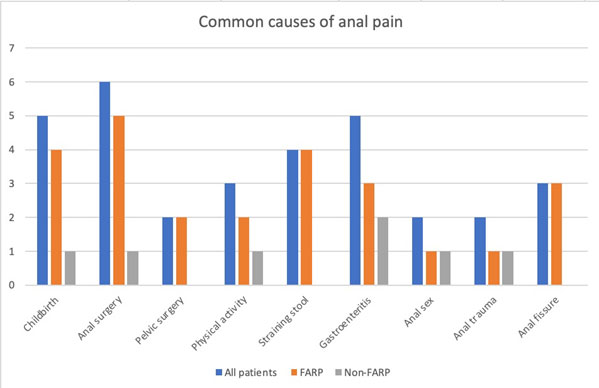
Here is an example to further understand the chart. In the case of childbirth, 4 women have stated to have felt any FARP pain, while one woman has stated to have felt none. On the other hand, in the case of anal fissures, all the patients have claimed to have felt any sort of FARP pain.
How do I know it’s my rectum that hurts?
While the obvious answer to this question is “because it hurts”, one might experience additional symptoms alongside the pain in the rectum. And even though some of the causes of this rectal pain can usually be treated alone and will go away quickly, you might experience additional symptoms that usually tend to include:
Itching
Fever
Burning sensation
Bleeding
Diarrhea
Nausea
Bloating
Pain during bowel movements
Painful urination
Rectal discharge
Leaking stool
Sudden rectal pain (spasm like)
When should I seek medical help?
As mentioned above, in some cases, rectal pain can be treated alone and will go away quickly. However, there are times when seeing a doctor is necessary. So, with that being said if you tick any of these symptom boxes below, call your doctor or any health care professional and book an appointment.
If you are having rectal pain that's getting worse or spreading to your lower part of your body
If your fever is abnormally high
If you are experiencing consistent rectal bleeding
If you feel lightheaded, dizzy, or faint during the rectal bleeding
If the pain lasts more than a few days
If you have suffered from anal trauma
If you feel a bulge at the anal opening
If the pain you are feeling is gradually getting more and more severe
How will the doctor diagnose my rectal pain?
The next step after having booked the doctor’s appointment is actually getting to the clinic. Once there, the doctor will have to determine the cause for the rectum pain experienced. The medic would run a variety of tests to get to the bottom of this. These tests include:
Looking at the patient’s medical history.
Checking the severity of the symptoms: stool examination and fever examination are two examples.
Rectal examination, which is when the doctor examines the rectum by inserting a finger into it to feel for abnormalities.
Endoscopy, where a thin, flexible tube with a camera is used by the doctor to examine the rectum's lining.

Are there any at home treatment?
In some cases, Rectal pain can be treated at home without the need to visit a doctor’s office. Here are some home treatments to try out.
Run yourself a warm bath with Epsom salt: Baths in warm water can aid in relieving any inflammation or irritation. And according Harvard Health, the warm bath should be taken 20 min after any bowel movement to be the most effective.
Increase your fiber intake: Most adults should consume between 25 and 30 grams of fiber per day, according to the American Heart Association.
Use aloe verra cream: Due to its anti-inflammatory properties, aloe verra is considered the holy grail for treating any sort of inflammation and irritation.
Take stool softeners: These may aid in the relief of constipation, the softening of stool, and the facilitation of fast, painless bowel movements.
Drink more water: Constipation might arise as a result of being dehydrated. Water might assist in keeping stools soft and easy to pass. Foods with a greater water content might also help you meet your daily water goal.
Apply over the counter hemorrhoid cream.
Get yourself some over the counter pain relievers like Tylenol or Advil.
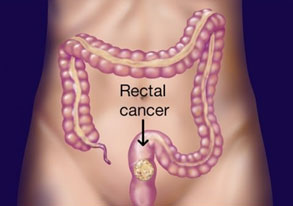
Is it Cancer?
In the beginning, anal, colorectal, and colon cancers are frequently painless. They may, in fact, cause no symptoms at all. If the tumors develop large enough to strain on tissue or an organ, the first signals of pain or discomfort may appear.
Rectal bleeding, itching, and feeling a lump or mass near the anal entrance are the most typical signs of rectal cancer. However, other disorders, such as abscesses and hemorrhoids, are more likely to cause these symptoms. It's always a good idea to consult your doctor if you have any concerns. They can evaluate your symptoms and advise you on the best course of action.
Reference list:
(Ana Gotter, Apr 19,2017) “8 Home Remedies for Hemorrhoids”, Healthline copywriter.
Derived from:
https://www.healthline.com/health/home-remedies-for-hemorrhoids
(Kimberly Holland, Aug 6, 2019) “What Causes Rectal Pain”, freelance health writer.
Derived from:
https://www.healthline.com/health/rectal-pain
(Jerry Kennard, Aug 21, 2020) “Common Causes of Rectal Pain”, psychologist.
Derived from: https://www.verywellhealth.com/rectal-pain-causes-2328384
(Vicky Theakston, Dec 10, 2018) “The Rectum”, GP Trainee.
Derived from: https://teachmeanatomy.info/abdomen/gi-tract/rectum/
Jeyarajah, Santhini, and Sanjay Purkayastha. “Proctalgia fugax.” CMAJ : Canadian Medical Association journal = journal de l'Association medicale canadienne vol. 185,5 (2013): 417. doi:10.1503/cmaj.101613
If you or anyone you know is suffering from pain, call us today on (469) 562 4188 to book an appointment with our expert doctors.